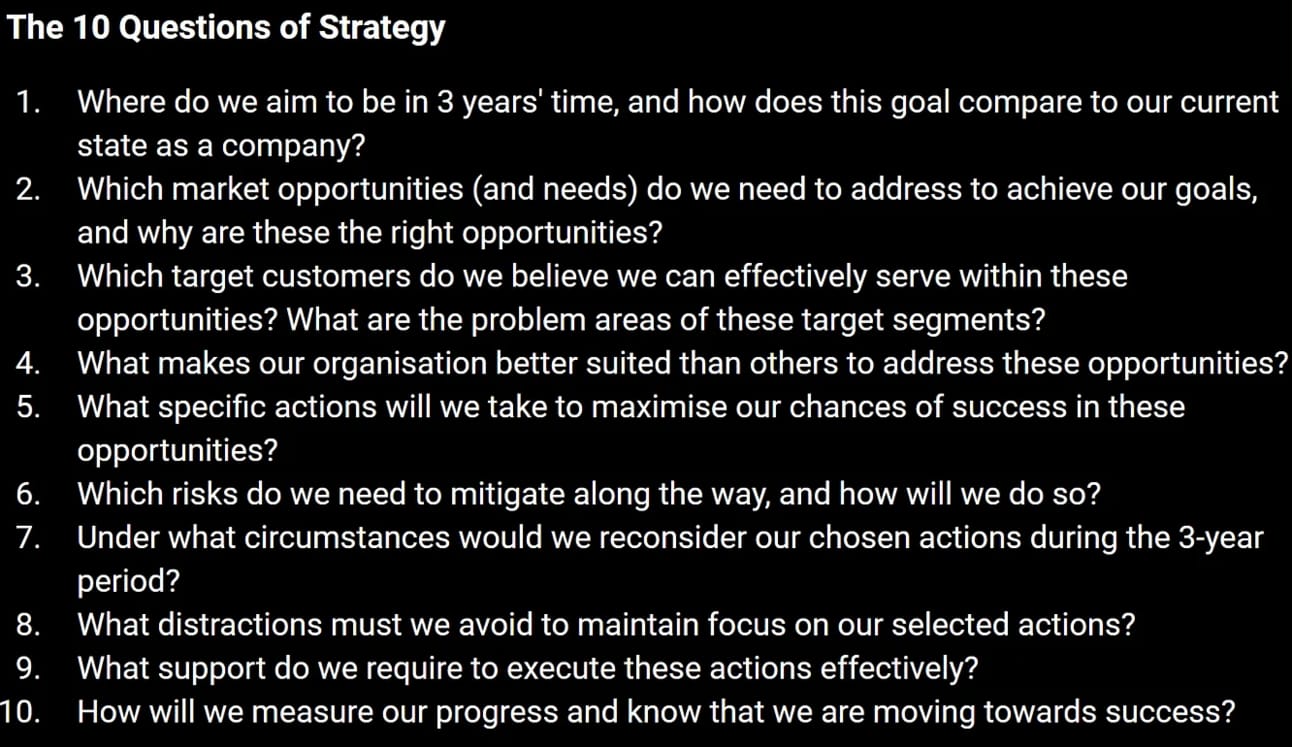Hey y’all — here’s today at a glance:
Opportunity → Going Undercover
Framework → The 10 Questions of Strategy
Tool → Insense
Trend → Anti-Detection Browsers
Quote → Scarcity Drives Velocity
PS — Become a member to get access to my founder membership including an engaged community, fundraising support, fireside chats and more.

🔗 Houck’s Picks
My favorite finds of the week.
Learn how to scale your SaaS startup using founder-led sales from someone who sold theirs for $125M to GoDaddy.
The TLDR on why investors have backed this hot AI startup (Link)
Why this founder moved his entire company in office and how it transformed everything (Link)
Why you should roll out your experiments to as many users as you can, as quickly as you can (Link)
YC’s W2024 mega batch of learnings (Link)
How this company did employee reviews and the benefits they got from them (Link)
A counterintuitive interview question for startup founders (Link)
How 9 months of building without success, 2 pivots, and dozens of rejections resulted in Loom (Link)

💡 Opportunity: Going Undercover
A lot of great founder stories have come out of Y Combinator, but this might be the craziest — and it may inspire you to pursue something similar.
It’s a genius way of uncovering the most painful problems that a certain target persona experiences:
Once a founding team decided to work together and knew what problem space they wanted to explore, they got jobs in the industry for months:
They did this as technical founders but you don’t need to be technical to do this — it’s not about active automation, it’s about building your understanding of the user.
And while there may be faster ways to get an MVP off the ground but I doubt many founders have the deep level of understanding of their user that the Arcimus team does this early in their journey.
The learning?
If you have a co-founder (or are going solo) and know who your target user is, but not how to best serve them, go undercover and feel their pain points firsthand. The more boring the job, the better.
🧠 Framework: The 10 Questions of Strategy
Plans are useless, but planning can ensure you’re prepared.
Answering the high-level, strategic questions in this framework early in your journey may not give you the right answers but it will let you plant a stake in ground with what your current beliefs are.
Over time, revisit them and evaluate what you were right about, wrong about, and where the jury is still out.
Iterate towards the truth.

🛠 Tool: Insense
Save 40+ hours on influencer sourcing and campaign management
Like us, you’ve probably tried various UGC and influencer marketing platforms, but Insense stands out because you: get applications from vetted creators within 2 days, get UGC within 10 days, can run various campaign types (product seeding, TikTok Shop, influencer posting, and more).
Book a free strategy call and get a $200 platform bonus by April 19.*
📈 Trend: Anti-Detect Browser
As X is teetering on the edge of being banned in Brazil, concerns about internet censorship are rising around the world.
Even before The Twitter Files started coming out after Elon bought the company, an increasing share of the population has looked for ways to protect their online privacy.

The traditional solution is downloading a VPN (like Tunnelbear) but browsers built from the ground up with privacy tools (like Octobrowser) are rising.
As a founder there are a few ways to explore this trend:
What other areas of people’s digital lives may need rethinking as a result of this trend? What other product areas can you approach from the first principle of user privacy to make a differentiated product?
Does AI enable additional disruptive opportunities for privacy-focused products, even in established markets?
I wouldn’t advocate for this, but if you wanted to help companies or other parties identify users who were using these tools what would you build?
💬 Quote: Scarcity Drives Velocity
When you have a lot of money or time, you tend to spend a higher percentage of it experimenting or exploring ideas.
When you have no recourse, you get shit done.
As Bryce notes below, this is counterintuitive at first and to most people. But as founders we know it’s true.
Building frugally increases your focus on the things that actually make or break the success of your startup. You simply can’t afford to care about anything else.

💡 How I Can Help
Become a member to join the community, get access to all 90+ deep dives, and fireside chats with experts.
Growth
Grow your audience + generate leads with my growth service.
Fundraising
Share your round with hundreds of investors in my personal network.
Hiring
Hire curated candidates from top startups and communities.
Advising
I’ll help solve a specific challenge you’re facing with your startup.
🚀 Advertise in this newsletter to get in front of 75,000+ founders.

“*” indicates sponsored content.



